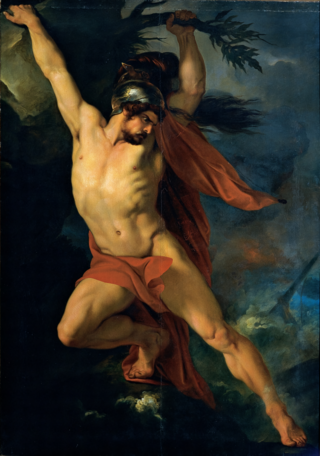Related Research Articles

Ajax was a Greek mythological hero, son of Oileus, the king of Locris. He was called the "Ajax the Less", the "lesser" or "Locrian" Ajax, to distinguish him from Ajax the Great, son of Telamon. He was the leader of the Locrian contingent during the Trojan War. He is a significant figure in Homer's Iliad and is also mentioned in the Odyssey, in Virgil's Aeneid and in Euripides' The Trojan Women. In Etruscan legend, he was known as Aivas Vilates.

In Greek mythology, Proteus is an early prophetic sea god or god of rivers and oceanic bodies of water, one of several deities whom Homer calls the "Old Man of the Sea". Some who ascribe a specific domain to Proteus call him the god of "elusive sea change", which suggests the changeable nature of the sea or the liquid quality of water. He can foretell the future, but, in a mytheme familiar to several cultures, will change his shape to avoid doing so; he answers only to those who are capable of capturing him. From this feature of Proteus comes the adjective protean, meaning "versatile", "mutable", or "capable of assuming many forms". "Protean" has positive connotations of flexibility, versatility and adaptability.

In Greek mythology, Phoenix was the son of king Amyntor. Because of a dispute with his father, Phoenix fled to Phthia, where he became king of the Dolopians, and tutor of the young Achilles, whom he accompanied to the Trojan War. After Achilles had in anger withdrawn from the war, Phoenix tried to persuade Achilles to return.
Ocypete was one of the three Harpies in Greek mythology. She was also known as Ocypode or Ocythoe. The Harpies were the daughters of the sea god Thaumas and the Oceanid Electra. Her harpy-sisters were Aello (Podarge) and Celaeno, whereas other mentioned siblings were Iris, and possibly Arke and Hydaspes. In other accounts, Harpies were called the progeny of Typhoeus, father of these monsters, or of Pontus (Sea) and Gaea (Earth) or of Poseidon, god of the sea.
Aloeus can indicate one of the two characters in Greek mythology:
In Greek mythology, Leucippe is the name of the following individuals:
In Greek mythology, Arne, also called Melanippe or Antiopa, was the daughter of Aeolus and Melanippe, daughter of Chiron.
In Greek mythology, there were several people named Melanippus :
Lycophron was a Hellenistic Greek tragic poet, grammarian, and commentator on comedy, to whom the poem Alexandra is attributed.

In Greek mythology, Lycaon was a king of Arcadia who, in the most popular version of the myth, killed and cooked his son Nyctimus and served him to Zeus, to see whether the god was sufficiently all-knowing to recognize human flesh. Disgusted, Zeus transformed Lycaon into a wolf, while Nyctimus was restored to life.

In Greek mythology, Erysichthon, also anglicised as Erisichthon, was a king of Thessaly. He was sometimes called Aethon.
In Greek mythology, the name Hyperochus may refer to:
In Greek mythology, Melia was an Oceanid, one of the 3,000 water nymph daughters of the Titans Oceanus and his sister-spouse Tethys. She was the mother of culture hero Phoroneus, and Aegialeus, by her brother Inachus, the river-god of Argos. However, in some accounts, Inachus fathered Phoroneus by an Oceanid nymph named Argia. According to Argive tradition, Phoroneus was the first man, or first inhabitant of Argos, who lived during the time of the Great Flood, associated with Deucalion.

In Greek mythology, Philyra or Phillyra was one of the 3,000 Oceanids, water-nymph daughters of the Titans Oceanus and Tethys.
In Greek mythology, Amyntor was the son of Ormenus, and a king of Eleon or Ormenium. Amyntor's son Phoenix, on his mother's urgings, had sex with his father's concubine, Clytia or Phthia. Amyntor, discovering this, called upon the Erinyes to curse him with childlessness. In a later version of the story, Phoenix was falsely accused by Amyntor's mistress and was blinded by his father, but Chiron restored his sight.
In Greek mythology, Daeira or Daira (Δαῖρα) was a divinity connected with the Eleusinian mysteries. Her name means the "knowing one" from daô knowing which links well to the inside knowledge of the initiate.
In Greek mythology, Astyaguia or Astyagyia was a Thessalin princess as the daughter of King Hypseus of Lapiths and probably the naiad Chlidanope. She was the sister of Cyrene, Themisto and Alcaea. Astyaguia married Periphas, son of Lapithus, and they had eight sons, the oldest of whom was Antion who became the father of Ixion by Perimela, daughter of Amythaon.
In Greek mythology, Rhoeo may refer to two distinct characters:
In Greek mythology, Scarphe was possibly the mother, by Aeson, King of Iolcus, of Jason and possibly Promachus.
Cassiphone is a minor figure in Greek mythology, the daughter of the sorceress-goddess Circe and the Trojan War hero Odysseus. Cassiphone and her tale do not appear in the Odyssey, the epic poem that narrates Odysseus' adventures, but rather she is mentioned in passing in the works of the Hellenistic poet Lycophron and the 12th-century Byzantine scholar John Tzetzes.
References
- Lycophron, The Alexandra translated by Alexander William Mair. Loeb Classical Library Volume 129. London: William Heinemann, 1921. Online version at the Topos Text Project.
- Lycophron, Alexandra translated by A.W. Mair. London: William Heinemann; New York: G.P. Putnam's Sons. 1921. Greek text available at the Perseus Digital Library.